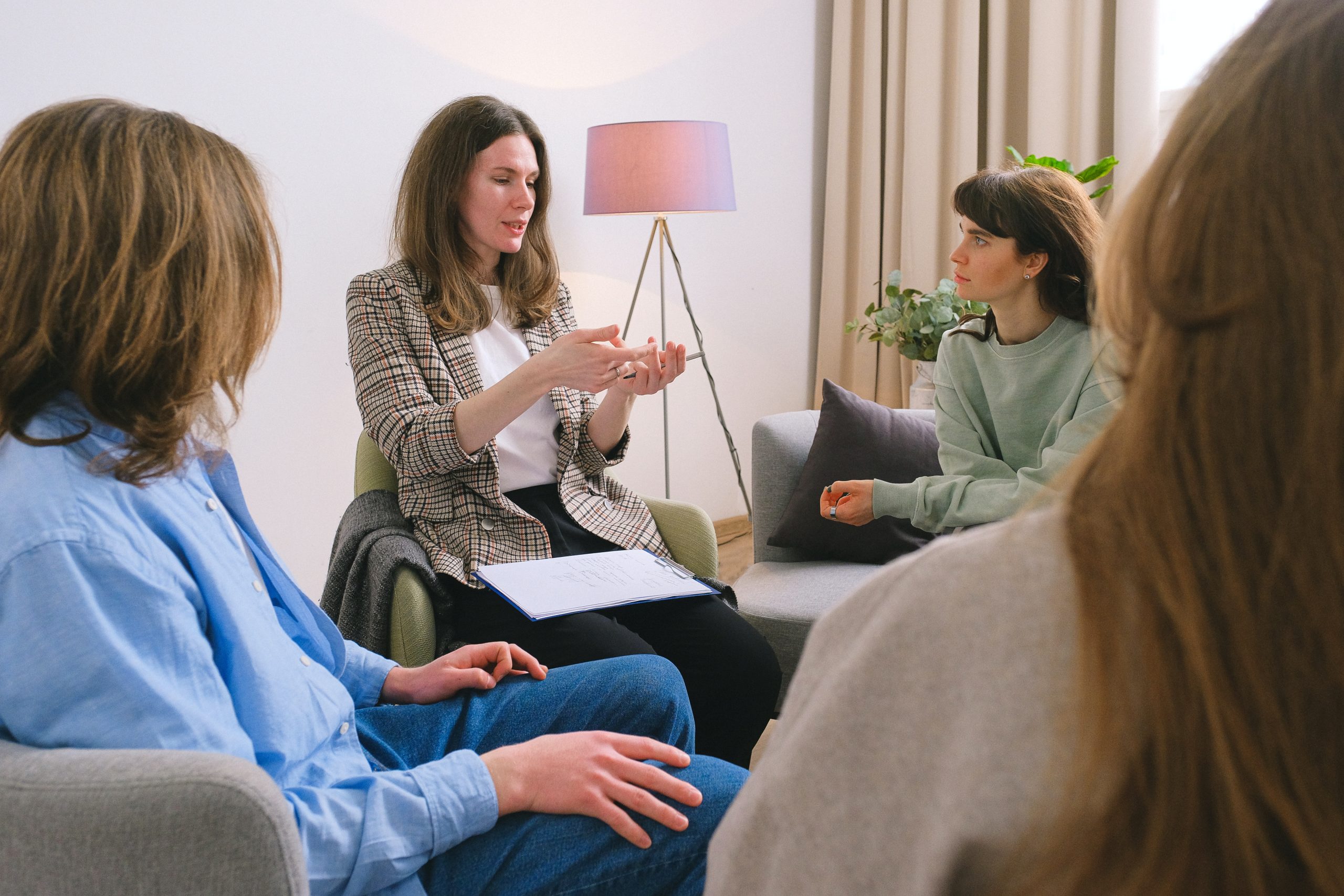Group Therapy for Depression is an increasingly recognized and effective treatment option for those struggling with depression. This form of therapy involves a group of individuals with similar issues coming together to discuss their problems and share experiences under the guidance of a trained therapist. Group therapy for depression can provide a sense of community and support that is essential to recovery.
Berkeley, CA is known for its progressive culture and commitment to mental health, and it is home to many therapists who specialize in group therapy for depression, including Dr. Lynn Winsten. With over 20 years of experience in the field, Dr. Winsten is an expert in Cognitive Behavioral Therapy (CBT), a popular and effective form of therapy for depression. Her approach to group therapy is based on the principles of CBT, which focuses on identifying negative thought patterns and replacing them with more positive ones.
Understanding Group Therapy
Group therapy is a form of psychotherapy that involves a small group of individuals who meet regularly with a trained therapist to work on their mental health concerns. Dr. Lynn Winsten is a clinical psychologist in Berkeley, CA who specializes in group therapy and has extensive experience helping individuals improve their mental health through this approach. Here is a brief overview of group therapy and how it works:
1. Structure of Group Therapy
Group therapy typically involves weekly sessions that last for around an hour and a half. The group is led by a trained therapist like Dr. Lynn Winsten who helps facilitate discussion and provides guidance to the group. Groups can range in size from three to fifteen members, depending on the goals and needs of the participants.
2. Types of Group Therapy
There are several different types of group therapy, including psychoeducation groups, support groups, process-oriented groups, and skills-focused groups. Dr. Lynn Winsten uses evidence-based techniques like cognitive-behavioral therapy (CBT) and dialectical behavior therapy (DBT) to help individuals improve their mental health and manage their symptoms.
3. Confidentiality and Privacy
Confidentiality and privacy are critical components of group therapy. Participants are required to agree to keep the information shared in the group confidential. This helps create a safe and trusting environment where individuals can discuss their experiences openly without fear of judgment or stigma.
4. Is Group Therapy Right for You?
Group therapy can be a valuable form of psychotherapy for individuals struggling with mental health concerns like depression, anxiety, and trauma. However, it is not the right fit for everyone. Individuals who prefer one-on-one therapy or have specific needs may benefit more from individual therapy. Dr. Lynn Winsten offers a free initial consultation to help individuals determine if group therapy is the right fit for them.
Benefits of Group Therapy for Depression
 Group therapy for depression has been shown to be an effective form of psychotherapy, providing numerous benefits for individuals struggling with depression. Dr. Lynn Winsten is a clinical psychologist in Berkeley, CA who specializes in group therapy for depression. Here are some of the benefits of group therapy for depression:
Group therapy for depression has been shown to be an effective form of psychotherapy, providing numerous benefits for individuals struggling with depression. Dr. Lynn Winsten is a clinical psychologist in Berkeley, CA who specializes in group therapy for depression. Here are some of the benefits of group therapy for depression:
1. Sense of Connection and Support
Depression can be a very isolating experience, and feelings of loneliness and hopelessness can be challenging to overcome alone. Group therapy provides a safe and supportive environment where individuals can connect with others who are going through similar experiences. This sense of connection and support can be a significant source of comfort and encouragement for individuals struggling with depression.
2. Different Perspectives and Feedback
In group therapy, individuals have the opportunity to gain different perspectives and feedback from peers who have different experiences with depression. This can be particularly helpful for individuals who struggle with self-doubt or have difficulty seeing their own progress. Dr. Lynn Winsten facilitates group therapy sessions in a way that encourages individuals to share their insights and offer support to others in the group.
3. Cost-Effective Option
Group therapy provides a cost-effective option for individuals who cannot afford individual therapy. By sharing the cost of the therapist’s time, individuals can access quality mental health care at a lower cost. This can be especially beneficial for individuals who need ongoing therapy but may not have the financial resources to do so.
4. Opportunity to Learn and Practice New Coping Skills
In group therapy, individuals can learn and practice new coping skills to manage their symptoms of depression. Dr. Lynn Winsten uses evidence-based techniques like cognitive-behavioral therapy (CBT) and dialectical behavior therapy (DBT) to help individuals improve their mental health and manage their symptoms. Group therapy provides an opportunity to learn these skills in a supportive environment and practice them with peers who are also working on their mental health.
5. Reduced Feelings of Stigma
Depression can be stigmatized, and individuals struggling with depression may feel ashamed or embarrassed about their condition. Group therapy can provide a space where individuals can discuss their experiences openly without fear of judgment or stigma. By being part of a group, individuals can feel less isolated and more accepted, which can help reduce feelings of shame and stigma.
Group Therapy in Berkeley, CA
Berkeley, CA, is a city known for its progressive culture and commitment to mental health. The city is home to many therapists who specialize in group therapy for depression, including Dr. Lynn Winsten.
Dr. Winsten is a licensed clinical psychologist who has been practicing in Berkeley for over 20 years. She is an expert in group therapy and has helped many individuals overcome depression through her practice. Dr. Winsten’s approach to group therapy is based on the principles of Cognitive Behavioral Therapy (CBT), which focuses on identifying negative thought patterns and replacing them with more positive ones.
The Role of CBT in Group Therapy
Cognitive Behavioral Therapy (CBT) is a widely recognized and effective treatment for a range of mental health conditions, including depression, anxiety, and post-traumatic stress disorder (PTSD). CBT is often used in group therapy, where a group of individuals with similar issues come together to discuss their problems and share experiences. In Berkeley, CA, there are many therapists who specialize in group therapy using CBT, including Dr. Lynn Winsten.
CBT is a form of therapy that focuses on identifying and changing negative thought patterns and behaviors. The goal of CBT is to help individuals develop more positive and productive ways of thinking and behaving, which can lead to improved mental health outcomes. In group therapy, CBT techniques can be particularly effective because individuals can receive feedback and support from both the therapist and their peers.
One of the advantages of group therapy using CBT is that it provides a sense of community and support for individuals who are struggling with mental health conditions. Group therapy sessions allow individuals to connect with others who are experiencing similar challenges, providing a sense of validation and understanding. Hearing from others who have successfully overcome similar challenges can provide inspiration and hope.
In addition to providing a sense of community, group therapy using CBT can also be more cost-effective than individual therapy. Group therapy sessions are often less expensive than individual therapy sessions, making them more accessible to individuals who may not have the financial resources to participate in individual therapy.
Group Therapy Techniques
Group therapy is a powerful tool for individuals who are struggling with mental health conditions such as depression, anxiety, and post-traumatic stress disorder (PTSD). In Berkeley, CA, there are many therapists who specialize in group therapy techniques, including Dr. Lynn Winsten. Here are some of the group therapy techniques used by therapists such as Dr. Winsten:
-
- Cognitive-behavioral therapy (CBT): focuses on identifying negative thought patterns and behaviors and replacing them with more positive ones. In group therapy, individuals can receive feedback and support from both the therapist and their peers, which can be particularly effective in helping individuals develop more positive and productive ways of thinking and behaving
- Dialectical behavior therapy (DBT): focuses on developing mindfulness skills, emotional regulation skills, and interpersonal effectiveness skills. In group therapy, individuals can practice these skills together and receive feedback and support from their peers and therapist.
- Interpersonal therapy (IPT): focuses on improving communication and relationships with others. In group therapy, individuals can practice communication skills, such as active listening and assertiveness, and receive feedback and support from both the therapist and their peers.
- Art therapy: involves using art materials and creative processes to explore and express emotions and experiences. In group therapy, individuals can create and share their artwork with others, providing a sense of community and support.
- Music therapy: involves using music to improve mental, emotional, and physical health. In group therapy, individuals can listen to and create music together, providing a sense of connection and emotional expression.
- Movement therapy: involves using movement and body awareness to improve mental and emotional health. In group therapy, individuals can practice movement exercises together, providing a sense of community and support.
Group therapy techniques can be a powerful tool for individuals who are struggling with mental health conditions. With experienced therapists such as Dr. Lynn Winsten in Berkeley, CA, individuals can gain the skills and insights necessary to overcome mental health conditions such as depression, anxiety, and PTSD. Techniques such as CBT, DBT, and IPT can be used to help individuals develop more positive and productive ways of thinking and behaving, improve communication and relationships with others, and practice mindfulness and emotional regulation skills. Additionally, art therapy, music therapy, and movement therapy can provide a sense of community and support, allowing individuals to express themselves creatively and connect with others who are experiencing similar struggles.
Joining a group therapy for depression can be a brave and empowering decision, especially when guided by a trained professional such as Dr. Lynn Winsten in Berkeley, CA. Remember, you are not alone and seeking help is a sign of strength, not weakness. You deserve to live a happy and fulfilling life, and group therapy can be a valuable tool in achieving that.
Understanding the Symptoms, Causes, and Treatment of Clinical Depression
When You Should Seek Help for Anxiety

